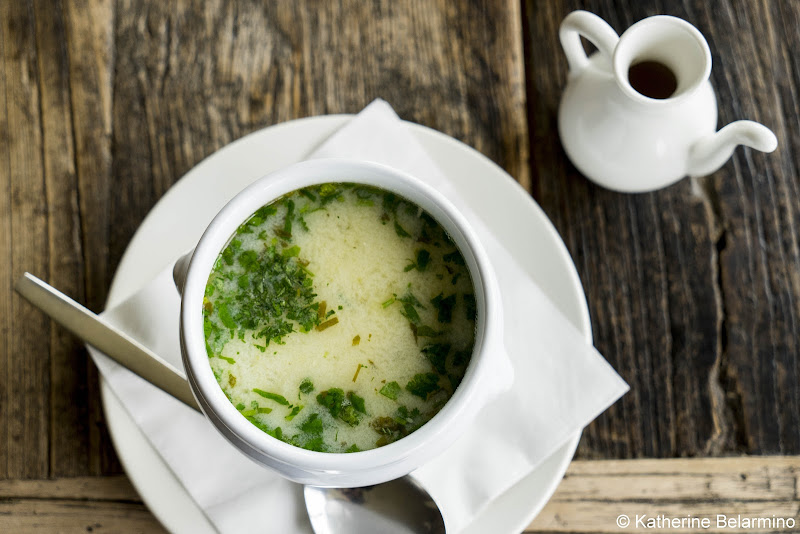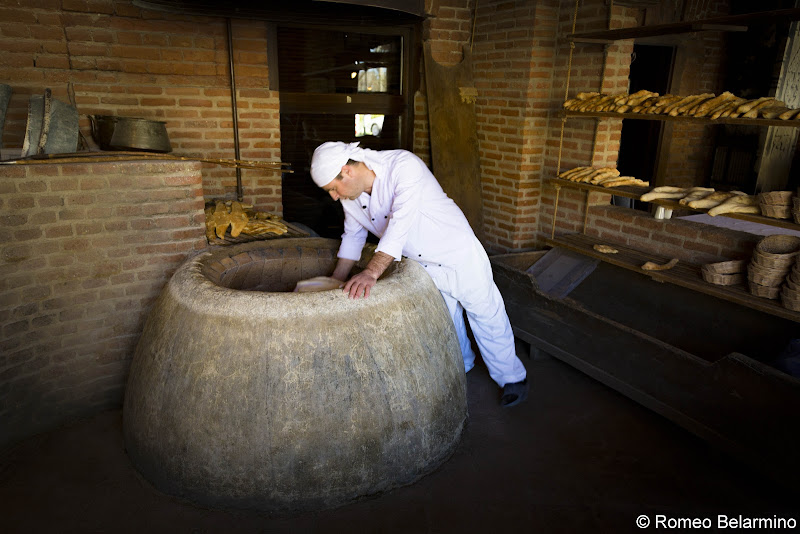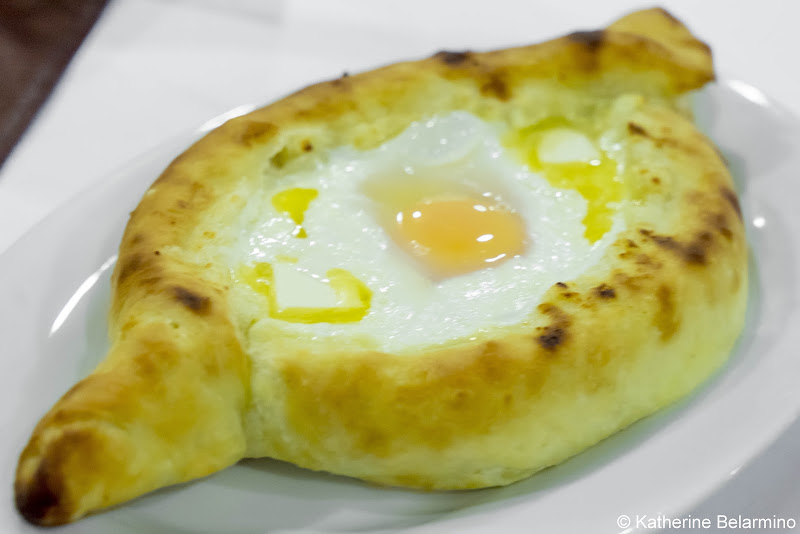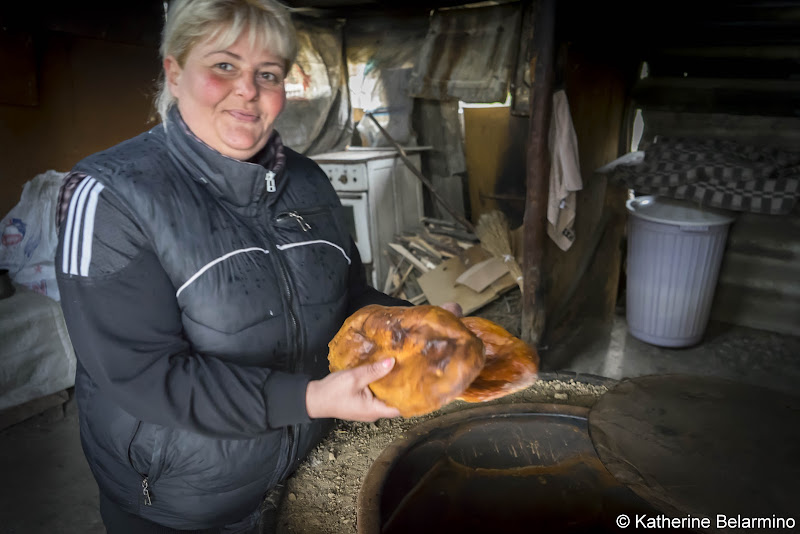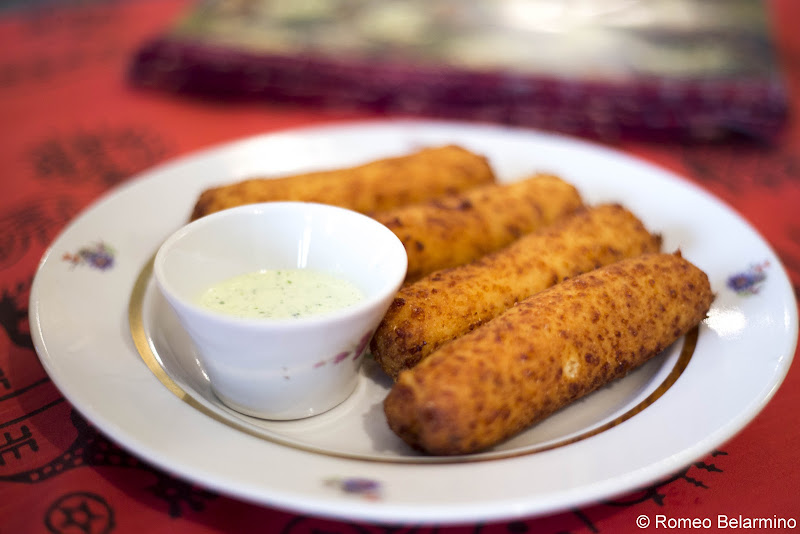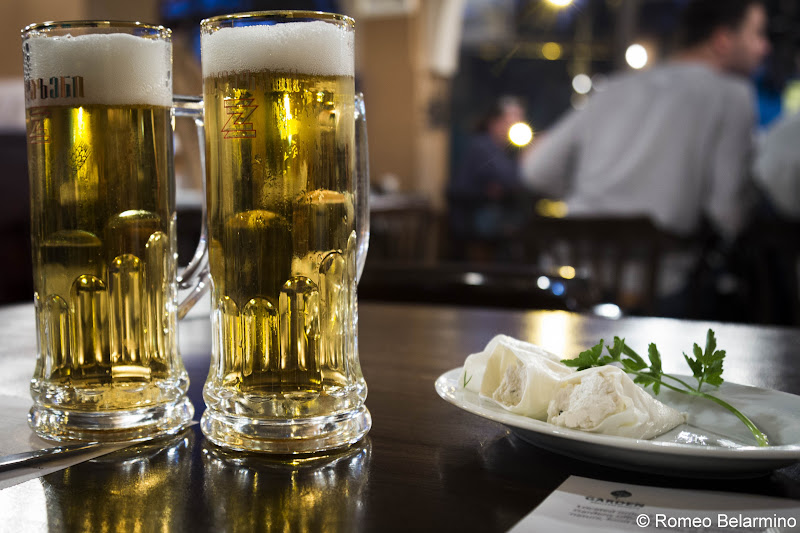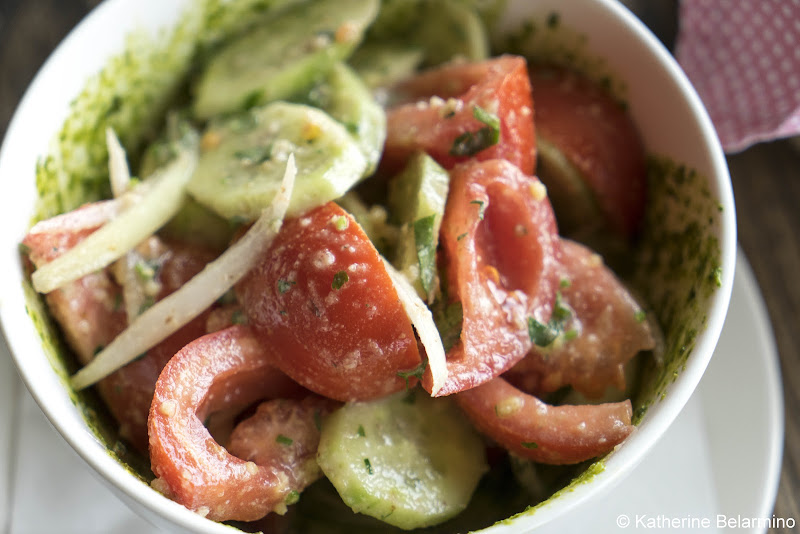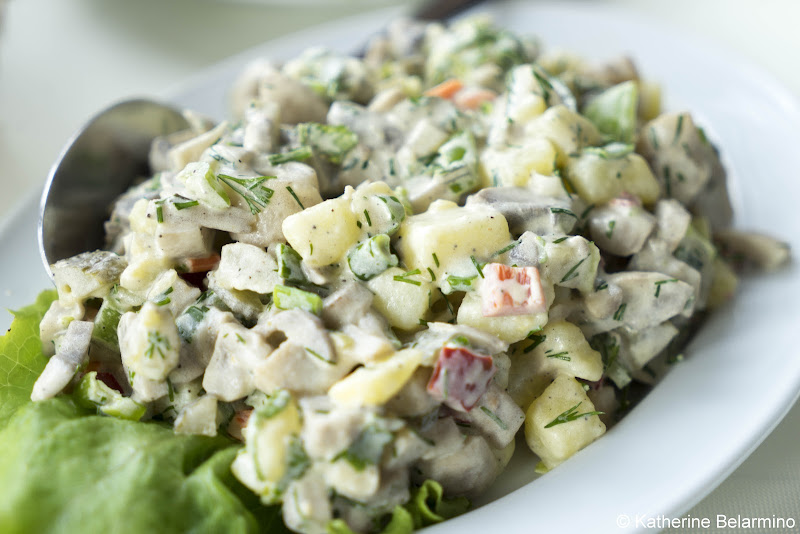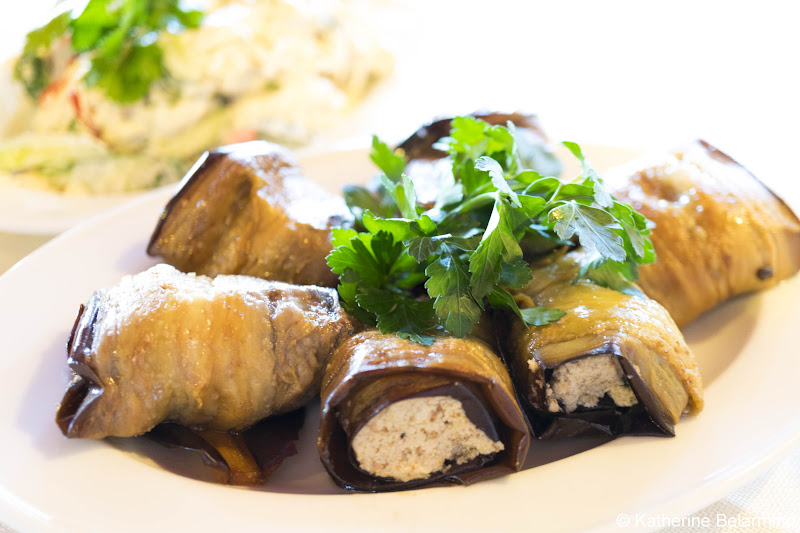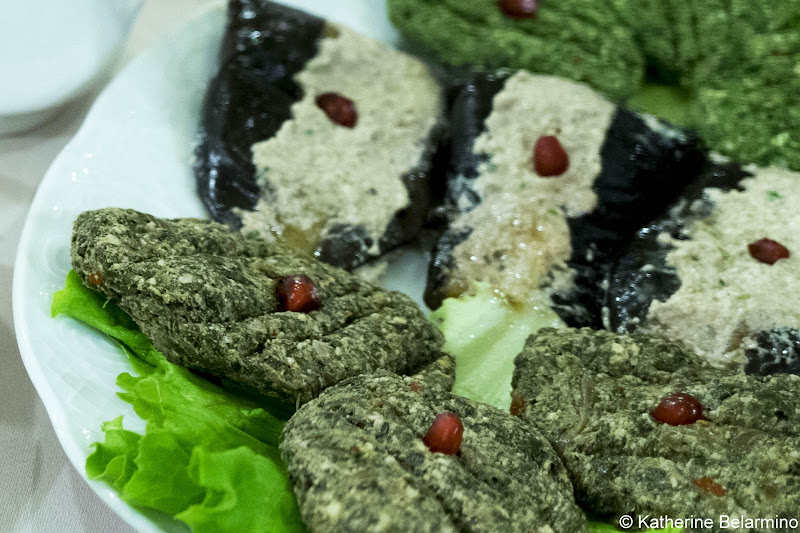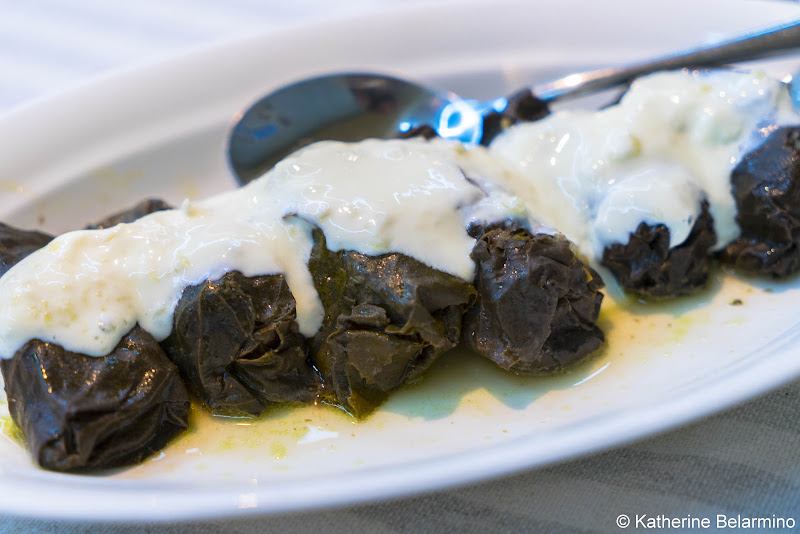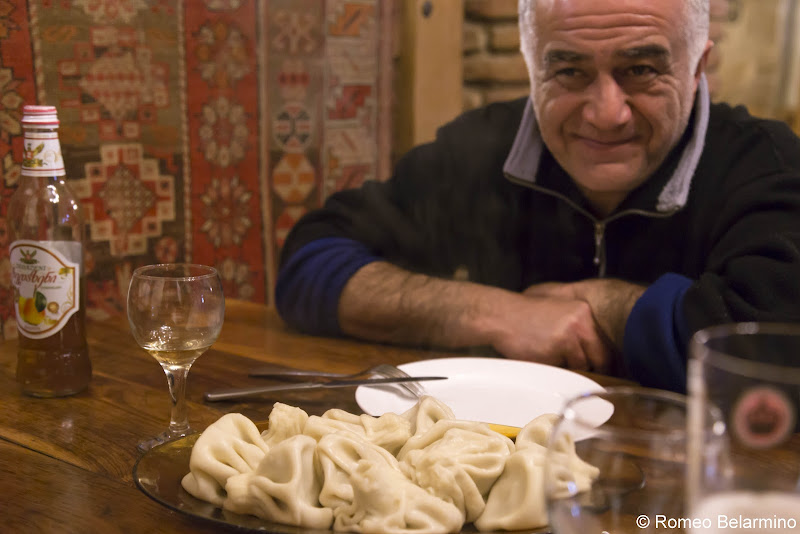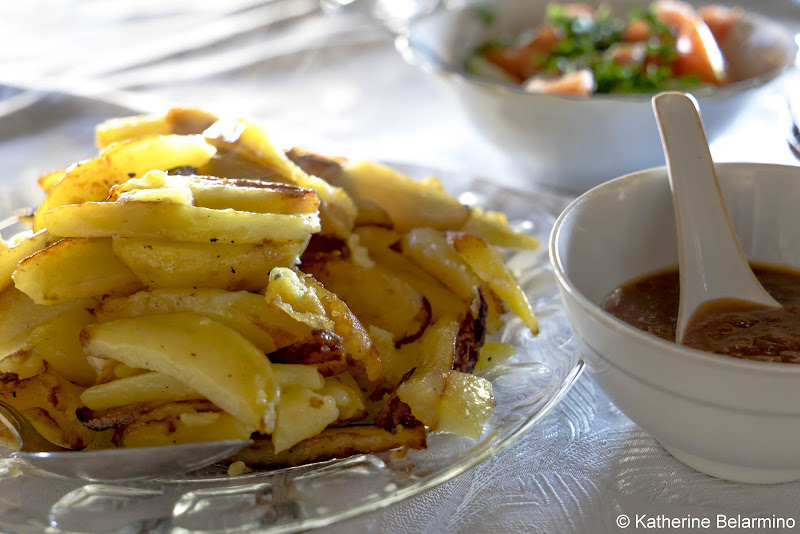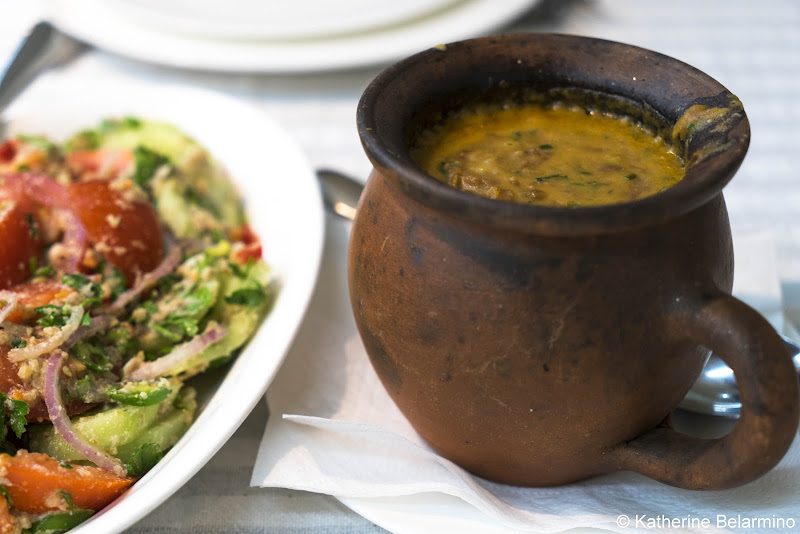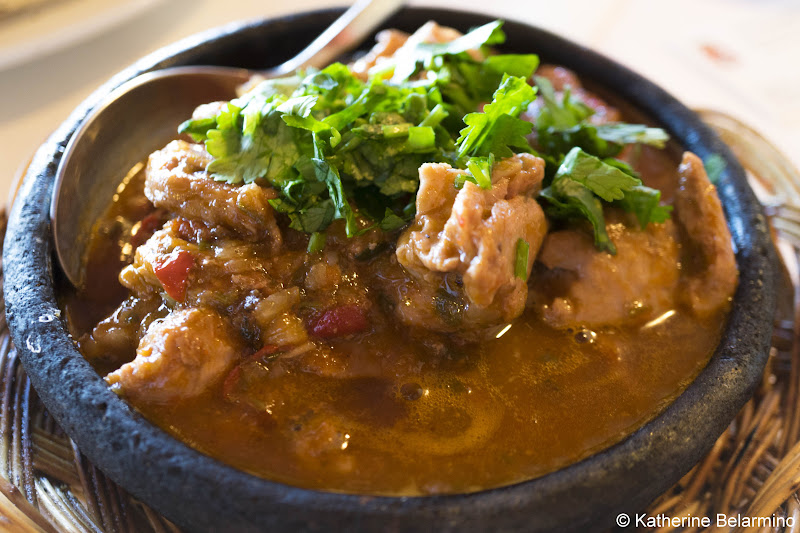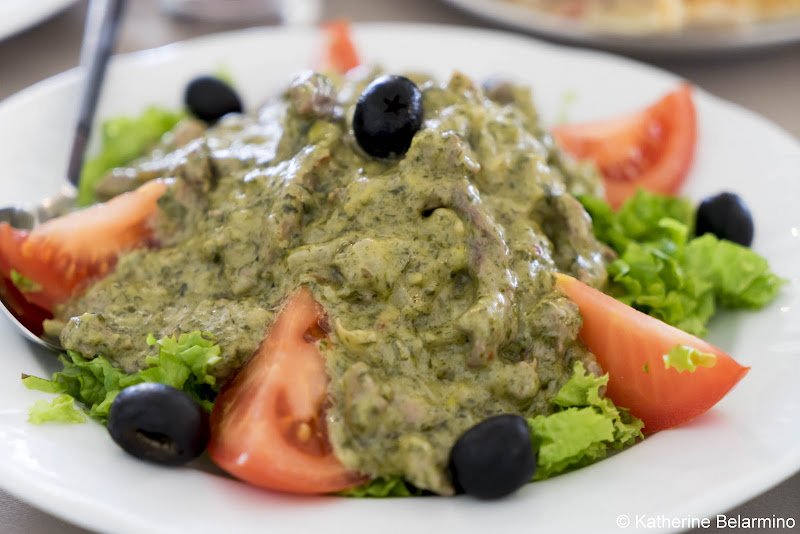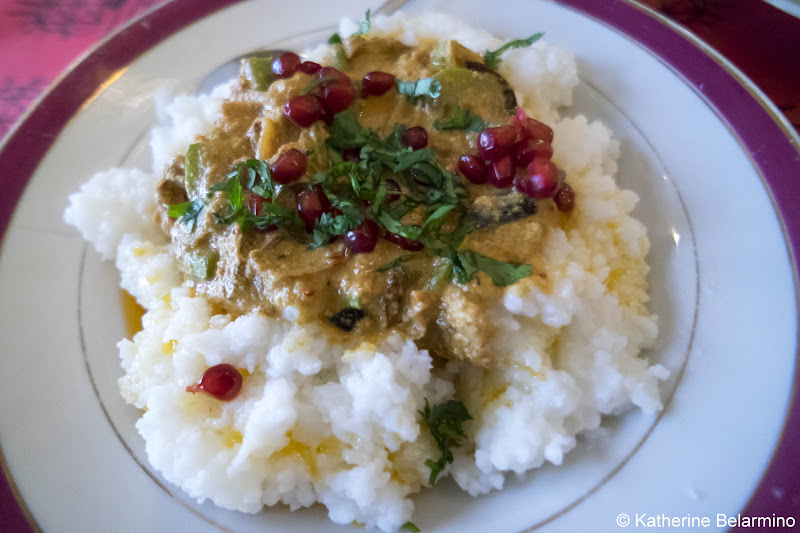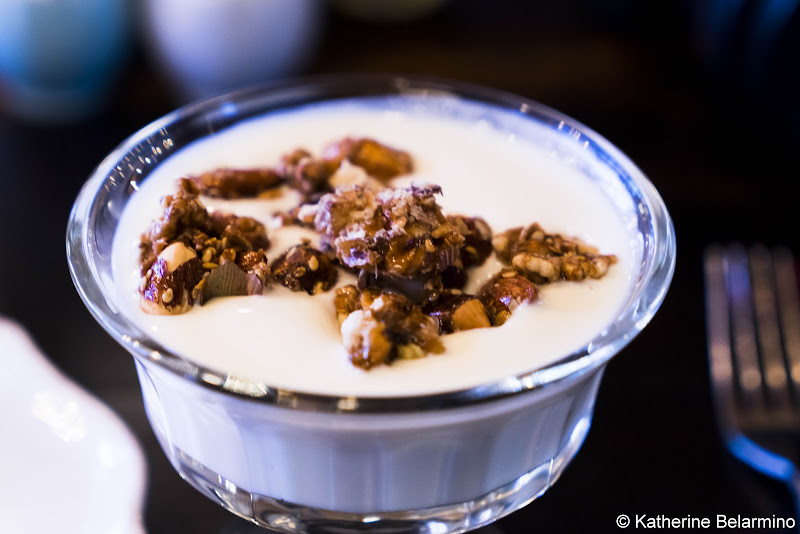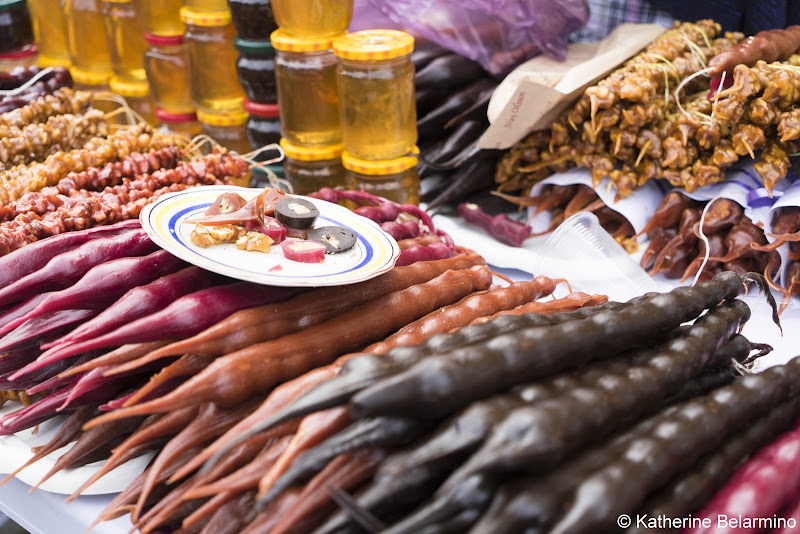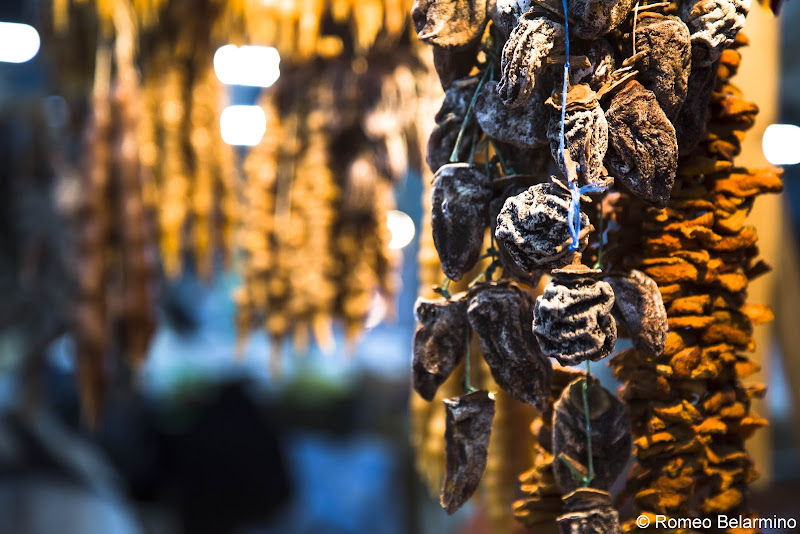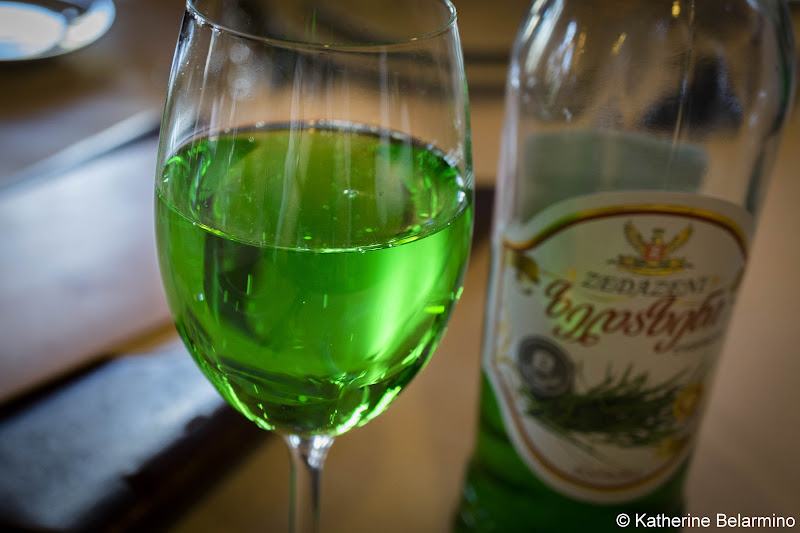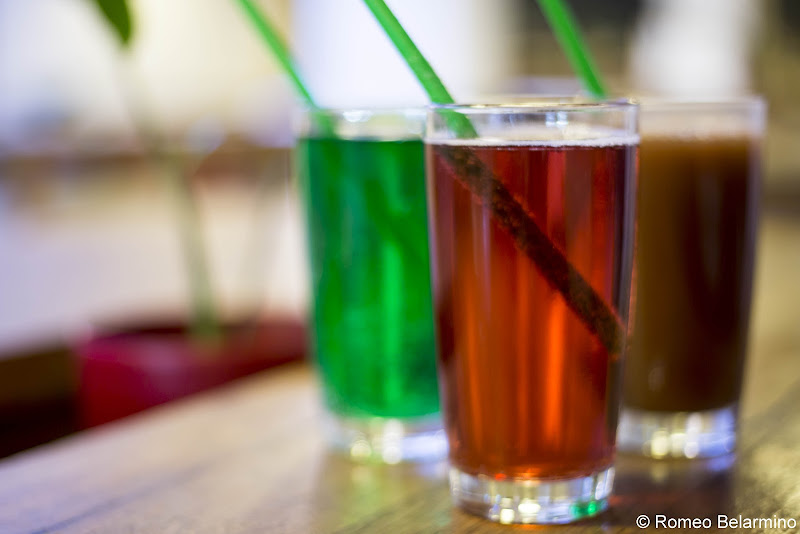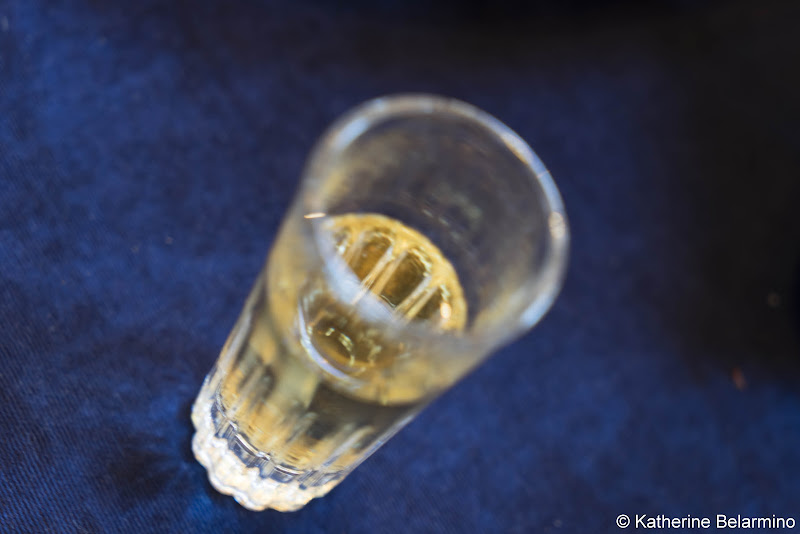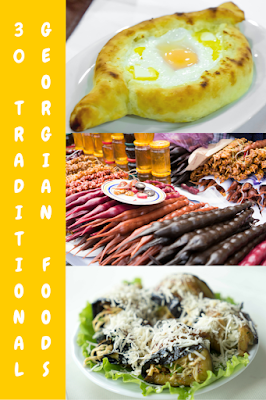While Travel the World isn’t a food blog per se, food is a very important part of our travels, so we write about it – a lot. Sometimes food is even the reason we travel. For instance, we have a restaurant in San Diego called Pomegranate that serves Russian and Georgian cuisine. I was so taken by the Georgian dishes I tried, those alone made me decide that I had to go visit the country that makes such delicious food. So travel to Georgia we did. Georgian cuisine is different from any other I’ve experienced. There are so many traditional Georgian foods and dishes unique to Georgia, and you have to order them all while traveling through Georgia because odds are you aren’t going to be able to get them at home.
Puri – პური (Georgian Bread)
Georgian food starts with bread. Bread is an essential component of the meal. Georgian bread is special. Georgian bread is baked in traditional bread baking ovens called tones. Tones are made of clay and look like the top half of clay pots. A fire burns at the bottom which heats up the sides of the oven. The bread dough is sectioned off and slapped onto the side walls of the oven to bake, turning brown and bubbly. Shotis puri (შოთის პური) is the most recognizable of the Georgia breads because of its oblong shape with pointy ends.
Khachapuri – სულგუნი (Georgian Cheese Bread)
Khachapuri, Georgian cheese bread or cheese pie, is another staple of the Georgian diet. There are multiple versions of this tasty treat, as they are region specific, and we wish we had been able to try them all. But we did try as many as possible.
Imeruli khachapuri (იმერული ხაჭაპური) is circular and has cheese on the inside.
Megruli khachapuri (მეგრული ხაჭაპური) is similar to imeruli, but has cheese and butter both inside and out.
Acharuli khachapuri (აჭარული ხაჭაპური) is shaped like a boat and filled with melted cheese, a raw egg, and a slab or two of butter. It’s served piping hot and you whisk the cheese, egg, and butter with a fork before ripping off the horns and edges and dipping them into the cheesy mixture.
And then there’s khachapuri on a spit, khachapuri shampurze (ხაჭაპური შამფურზე), where the dough and cheese gets wrapped around a metal skewer and gets cooked on the barbecue.
Another type of Georgian cheese pie we didn’t get a chance to try is guruli khachapuri (გურული ხაჭაპური). This type of cheese pie is specific to the region of Guria, has hard-boiled eggs inside, and is popular for Christmas.
Nazuki – ნაზუქი (Georgian Spice Bread)
Nazuki is a very special Georgian bread that is not available everywhere. Nazuki is specific to the town of Surami, a small town in west Georgia. As soon as you approach Surami there are individual roadside bakeries lining both sides of the street. Nazuki is a fragrant clove, cinnamon, and raisin bread which is baked just like other Georgian breads, in a tone oven. Each baker hut has a stand outside displaying the bread, usually plastic versions, and a woman stands outside waiting for a customer to stop. We chose our stand and the woman brought us inside her little roadside bakery and gave us nazuki still warm from the oven.
Chvishtari – ჭვიშტარი (Georgian Corn Bread)
Chvishtari is a Georgian corn bread from the Svaneti region. Chvishtari is filled with cheese. We’ve decided the US should toss out the fried cheese sticks and serve the delectable chvishtari instead.
Sulguni – სულგუნის (Cheese)
Sulguni is a Georgian cheese. It is similar to mozzarella in texture. It’s salty and it is stringy, so you can unwrap it in sections. Sulguni can be ordered on its own as an appetizer. It is also used as an ingredient in Georgian dishes like khachapuri.
Nadugi – ნადუღი
Nadugi is a Georgian appetizer consisting of fresh cheese mixed with mint and wrapped, cone-like, in a thin layer of Sulguni cheese. At first I thought it was cheese wrapped in a crepe rather than in more cheese.
Jonjoli – ჯონჯოლი
Jonjoli is an interesting appetizer traditional to Georgia. Jonjoli is pickled sprouts. They’re not very pretty to look at, and they’re a bit of an acquired taste too. They taste most similarly to salty olives.
Kitris da Pomidvris Salata Nigvzit – კიტრი და პომიდვრის სალათი ნიგვზით (Tomato Cucumber Salad with Walnuts)
Salad is a term used loosely to mean an appetizer. A standard salad offered at Georgian restaurants is made with cucumbers and tomatoes, kind of similar to Greek salad but without the feta cheese. These salads vary depending on the restaurant. Our favorite was the salad with walnut dressing. Walnuts are one of the staples of Georgia and the walnut dressing is thick and creamy.
Qatmis Salati – ქათმის სალათი (Georgian Chicken Salad)
Another salad that is commonly on Georgian menus is qatmis salati, a simple chicken salad with chopped chicken, onions, mayonnaise, and seasonings.
Salata Olivie – ოლივიე (Russian Potato Salad)
Salata olivie is technically a Russian dish, but since Georgia once was part of the Soviet Union, Russian and Georgian cuisines have combined and some Russian-based dishes are popular on Georgian menus. The salad is a chicken and potato salad dressed with mayonnaise and is traditionally made for the New Year.
Badrijai Nigvzit – ბადრიჯანი ნიგვზით (Eggplant Walnut Rolls)
Another popular appetizer is badrijai nigvzit. Thin, long slices of eggplant (or aubergine) are cooked until brown and soft, then a paste of walnuts, vinegar, and spices is spread on the eggplant slices, which are then rolled.
Georgian Pkhali Board – ფხალი (Walnut Salad)
A pkhali board is a selection of different appetizers. Pkhali is another dish that translates as a salad, but is more of a small appetizer. Pkhali is a patty of minced greens and ground walnuts. Popular choices include spinach pkhali and beetroot pkhali. Pkhali boards also come with appetizers you can order on their own, like the badrijai nigvzit, but others, like the similar and most delicious red pepper stuffed with walnut paste, are not usually menu items that can be ordered alone.
Tolma – ტოლმა (Stuffed Vine Leaves)
Tolma is a dish that is made in many countries, usually under the name dolma, including Turkey, Armenia, and Greece. A mixture of meat and rice is wrapped in cabbage or vine leaves. In Georgia these little green packages are topped with a garlicy sauce made with matsoni.
Khinkali – ხინკალი (Soup Dumplings)
Khinkali are what you eat when you’re looking for a cheap, casual meal or a hangover cure. Khinkali are somewhat similar to xiaolongbao, or Chinese soup dumplings, but there are differences too. Khinkali are made with flour dumpling wrappers. They are folded in such a way that they have little dough handles at the top. To eat khinkali, hold the dumpling by the handle, flip it bottom side up, and take a small bite out of the dough just large enough to slurp the soup before devouring the rest of the dumpling. The handles aren’t meant to be eaten, though we were told that caused quite a problem during the Russian occupation as the Russians thought this was wasteful and prohibited the import of flour, which meant a lot of sad Georgians with no khinkali. While in China you enhance the flavor of soup dumplings with vinegar; in Georgia you douse them with a lot of black pepper. If your dumplings get cold because you are eating too slow or talking too much, you can ask the waiter to have them reheated and they won’t think less of you for it.
Chikhirtma – ჩიხირთმა (Chicken Soup)
Chikhirtma is a brothy chicken soup, but if it’s made right it is extremely flavorful. The secret is the vinegar, egg, and flour. The vinegar gives the soup a delightful tang and the egg and flour makes it a little bit thicker and heartier than your standard chicken soup.
Mtsvadi & Tkemali – მწვადის & ტყემალი (Kebab with Sour Plum Sauce)
Georgian kebab (mtsvadi) and sour plum sauce (tkemali) are where Rome’s and my food tastes meet. He loves all meat, especially pork, and especially kebab. I’m just okay with it on its own, but add a delicious sauce, and I am on board! Plum sauce may sound like it’s going to be sweet, but Georgian plum sauce is sour. It comes in red, which is a little sweeter, or green, which is the more sour of the two. The green plum sauce is my favorite. It is delectably tart and is somewhat similar to chimichurri as it is herby as well. Apparently I’m not the only one who could eat all day just for the plum sauce. There is a Georgian saying that roughly translates to, ‘the plum sauce was so good we ate the whole piglet.’ If the kebab is served on a spit, the Georgian way is to slide it off using puri.
Fried Potatoes with Tkemali Sauce – შემწვარი კარტოფილი ტყემლით
A common side dish is salty fried potatoes. These provide yet another excuse to eat sour plum sauce.
Lobio – ლობიო (Beans)
Another common side dish is beans, called lobio, made with beans, onions, and herbs. Each recipe we tried was a little different. Some are thick and creamy (our favorite). Some are soupy. Lobio is usually served in a traditional small clay jar.
Chashushuli – ჩაშუშული (Veal Stew)
Veal chashushuli is a traditional Georgian dish, a tomato-based stew with onions and red peppers and a lot of flavor.
Chakapuli – ჩაქაფული (Stew with White Wine and Tarragon)
Another stew-like Georgian dish is chakapuli, and this one was one of my favorites. Chakapuli is traditionally made with lamb, but it can also be ordered with veal. This tasty dish gets its layers of flavor from white wine, tarragon, sour green plums, and coriander.
Kharcho – ხარჩო
Yet another traditional Georgian soup is kharcho. This soup is made with beef or chicken and can be served with or without rice. The version we had was vegetarian and contained eggplants, zucchini, walnuts, and pomegranate and was served on hominy.
Trout with Pomegranate Sauce – კალმახი ბროწეულის სოუსში
Even though Georgia has a sea coast along with tons of rivers and lakes, seafood is not very common on Georgian menus. However, we did find trout on a couple menus. A popular Georgian seafood dish is trout with pomegranate sauce. The trout is fried whole, nice and crispy, and served with a sweet and savory pomegranate sauce.
Matsoni – მაწონი (Georgian Yogurt)
Matsoni, or Georgian yogurt, was my favorite breakfast item. Matsoni is a fermented dairy product that is served at room temperature. It’s nicely sour. It is thinner than Greek yogurt. It is served in the morning, but is also used as a marinade and in sauces. Note that if you are looking for matsoni in the morning, you’ll need to ask for it by name. If you ask for yogurt, you’ll be given packaged yogurt like Yoplait.
Churchkhela – ჩურჩხელა
If you watched The Amazing Race this season, then you’ve seen churchkhela. One of the challenges involved teams making churchkhela, a popular Georgian candy. Toasted nuts, walnuts in the east and hazelnuts in the west, are strung on a string and dipped into a flour, sugar, and grape juice mixture. The result is a reddish or brownish sausage-shaped candy with a pointy end.
Karaliokis Chiri – კარალიოკის ჩირი (Dried Persimmons)
While churchkela is the most popular Georgian sweet, another Georgian sweet that evokes childhood memories in the minds of many Georgians is karaliokis chiri, dried persimmons. Hard persimmons are cleaned, peeled, strung together by the stems, and dried in the sun for a couple weeks until they are completely dried. The result is a pruney looking item that is sweet, soft, and delicious.
Borjomi – ბორჯომი (Mineral Water)
Borjomi is Georgia’s favorite mineral water. You can find bottled Borjomi everywhere, and you can visit Borjomi-Kharagauli National Park and drink the water straight from a fountain. Borjomi is also so popular in Russia, Russians travel to Georgia to visit the town of Borjomi so they can visit the place from which their favorite water comes.
Limonati – ლიმონათი (Georgian Lemonade)
When Georgians aren’t drinking Borjomi, wine, or beer, they drink lemonade. It seems to be the non-alcoholic beverage of choice, more popular than soda. Georgian lemonade comes in all sorts of fun flavors and, despite what the name implies, isn’t made from lemons. Georgian lemonade is made with water, sugar, carbonation, and natural flavoring. Popular flavors include tarragon (which is radioactive green yet really delicious with a licorice flavor), pear, and vanilla (which tastes kind of like a cream soda or orange creamsicle).
Lagidze Water – ლაღიძის წყალი (Georgian Soda)
Lagidze water is a fizzy flavored soda which will make you feel like you traveled back in time to the 1950s, the time of soda fountains. However, Lagidze water was developed long before then. It was invented by the Georgian pharmacist Mitrofan Lagidze in the late 1800s. Lagidze came up with the idea to use natural syrups with soda and created unique flavors like cherry, tarragon, pear, and more. You can also order flavors like grape and chocolate.
Qvevri Wine – ქვევრის ღვინო
The wine of Georgia is so special, the process of making it is a UNESCO World Heritage tradition. Georgians have been making wine for 8,000 years in qvevris, huge clay jars that have pointed bottoms and are buried in the ground. Grapes are crushed and the juice with skins and stems pours into the qvevri where it ferments. Georgian white wine is a deep amber color and Georgian red wine is so dark they call it black wine.
Chacha – ჭაჭა (Vine Vodka)
If there’s wine, there’s going to be hard alcohol made with the wine leftovers. Georgian chacha is a strong spirit made with the grape residue from winemaking. It is sometimes called vine vodka and is pretty potent stuff.
Thank you to the Georgian National Tourism Administration for hosting our trip to Georgia and making this post possible. As always, all opinions are my own.
